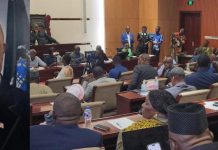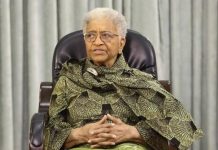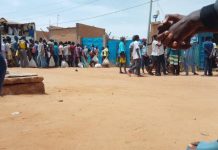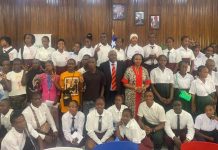Africa-Press – Liberia. Crisis at the National Elections Commission (NEC) seems to be far from over as Cllr. Teplah Reeves, Co-Chairperson of the Commission, accused her colleague, Chairperson Davidetta Browne Lansanah, of “flagrant disrespect.”
Reeves, in a memo, claimed that the decision by the NEC to award Laxton, a Dutch company, the contract for the supply of biometric voting materials for the 2023 elections was done out without respect for the entire NEC Board of Commissioners and “unilaterally”.
The four-page memo, which was leaked to the Daily Observer, accused the NEC Chair, among other faults, of hijacking the procurement process even though she “recused herself” — leaving the remaining six members of the Board of Commissioners with the decision of selecting the company for the supply of biometric voting materials.
“From all indications, Madam Chair, you have no regard for this current BOC (Board of Commissioners) because you have shown flagrant disrespect in many instances [and] this is what you have exhibited in this procurement process,” Reeves said in the four-page memo to Lansanah.
“I was surprised and bewildered by your actions without calling me to any discussion after giving the BOC my performance report and indicating in the report that the BVR is ongoing and the process will be concluded by November 23; only to read local dailies that NEC had picked Laxton for the biometric contract.”
The memo, however, appeared to validate the complaint of some members of the NEC Board of Commissioners that decisions including awarding of major procurement contracts to companies are unilaterally made by the chairperson without consultation. And this is something Reeves’ memo alludes to as well.
Laxton, the company that is now at the center of the NEC internal wrangling, has been awarded the contract, which is worth more than US$11 million for the supply and delivery of biometric voter registration equipment for next year’s elections. This comes after the Public Procurement and Concessions Commission (PPCC) approved a new request from the NEC for ‘no objection’ to award Laxton, which claims on its website to have been trusted by over 300 government bodies around the world.
Laxton Group was chosen by the NEC as the most responsive bidder upon review of the remaining bidders, considering responsiveness to the re-demonstration, capacity to pre-finance, accessibility of supplier, and responsiveness to other indicated requirements in the bid.
“… the ‘No Objection’ is hereby rendered for the NEC to award the contract to LAXTON Group for US$11 million (plus) for the supply and delivery of biometric voter registration equipment, software, and materials for the 2023 Presidential and Legislative Elections,” said a letter from the PPCC Executive Director, Attorney Roseline Jargbe Kowo.
“The PPCC, upon overall review of NEC’s submissions, accompanying documents, and subsequent clarifications, hereby [orders] the NEC to ensure quality conformance, for this contract package, given its critical nature and given that this is the first biometric voter registration pilot for Liberia.
The PPCC’s decision to approve the NEC’s ‘no objection’ request came after nearly four months of stalemate over the NEC’s earlier resolve to award EKEMP, a Chinese company that the NEC originally claimed had won the bid for the contract to supply the biometric equipment to kick-start the December 15 voter registration exercise for next year’s elections.
EKEMP lost the right to the bid after PPCC held its ground, twice denying the electoral body’s request for ‘no objection’. This was based on EKEMP’s inability to print a sample of the voter registration card on the spot as required by the NEC — and within the required timeframe — which showed uncertainty on the usage of its equipment and raised doubts about its effectiveness.
The PPCC, after rejecting EKEMP, asked the NEC to look among the remaining companies and select the most responsive company — leading to the selection of Laxton.
The other companies whose bids were considered include the partnership HID Global and Professional Services International (PSI); the joint venture Waymark and Mwetana; and ESI. HID Global/PSI, according to the NEC procurement panel report, was one of the most responsive bidders in terms of delivery time and capacity to pre-finance. Waymark, a South African company in a joint venture with Mwetana, a Liberian company, was also one of the companies said to have met the threshold of responsiveness as reported by NEC’s procurement panel. ESI, a Canadian company, is another of the remaining four companies.
However, for Laxton, a Dutch company, the panel claimed that the criteria of timely delivery, and capacity to pre-finance, among others, were not met. This is something that Reeves in her memo reminded Lansanah of, claiming that the NEC Chair on October 25 wrote the PPCC and made it clear that Laxton was not one of the responsive companies because the company used laptops to print and de-duplicate rather than “the required rugged biometric tablets as stated in the NEC bid document.
“In the NEC’s October 25 response to PPCC’s October 21 letter, it was clearly written that Laxton was unresponsive, mainly with its delivery period set at one hundred forty-seven (147) days as of the date of signing of the contract.
“In view of the foregoing, how could you, Madam Chair and Procurement Committee, turn to Laxton to be a responsive bidder again after the Bid Evaluation Panel’s conclusion on Laxton, as indicated in your October 25, letter to PPCC?” Reeves asked rhetorically.
Reeves’s concerns mean that instead of the biometric voter registration beginning as scheduled in December and ending in March, it would begin in April, a time many considered a recipe for a constitutional crisis as it may interfere with the constitutional elections day.
The most responsive bidder, according to Reeves, should show value for money, delivery in the shortest possible time and the ability to pre-finance … “these conditions should not have been compromised in selecting a vendor for the BVR process.”
The NEC’s plan to use a biometric voter-identification system, which would be the first of its kind in the country’s election history, is to prevent electoral fraud and chaos, which has marred previous elections.
The move comes as NEC has for years been under pressure to dash its optical manual registration (OMR) system. The OMR system, for many, does not improve the accountability and transparency of electoral processes and is usually tainted by controversy and mistrust.
The NEC’s planned use of the technology comes at a time when it is expected that more than two million Liberians will be eligible to vote in the 2023 presidential and legislative elections. It is anticipated that the biometric system will help the electoral body to better secure the voter roll and the integrity of the elections process: voter registration, voter verification, and the transmission of results.
Its use is intended to meet complex electoral challenges — arrest multiple registrations by a single voter and multiple voting, while supporting other mechanisms to avoid voter fraud and manipulation. The biometric voting system aims to provide a unique list of voters with zero duplicate voters.
Meanwhile, NEC Chair Lansanah, when contacted for a response to the memo, said via phone that Reeves, who is the author of her memo, should explain better to the press.
“My advice to you is that the Co-chair wrote the letter that you claim to be quoting. Go there; she will explain better. I don’t have anything to say,” Lansanah said.
For More News And Analysis About Liberia Follow Africa-Press

![Liberia: ‘Flagrant Disrespect in [NEC] Procurement Process’ Liberia: ‘Flagrant Disrespect in [NEC] Procurement Process’](https://static.africa-press.net/liberia/sites/37/2022/11/postQueueImg_1669810798.17.jpg)




